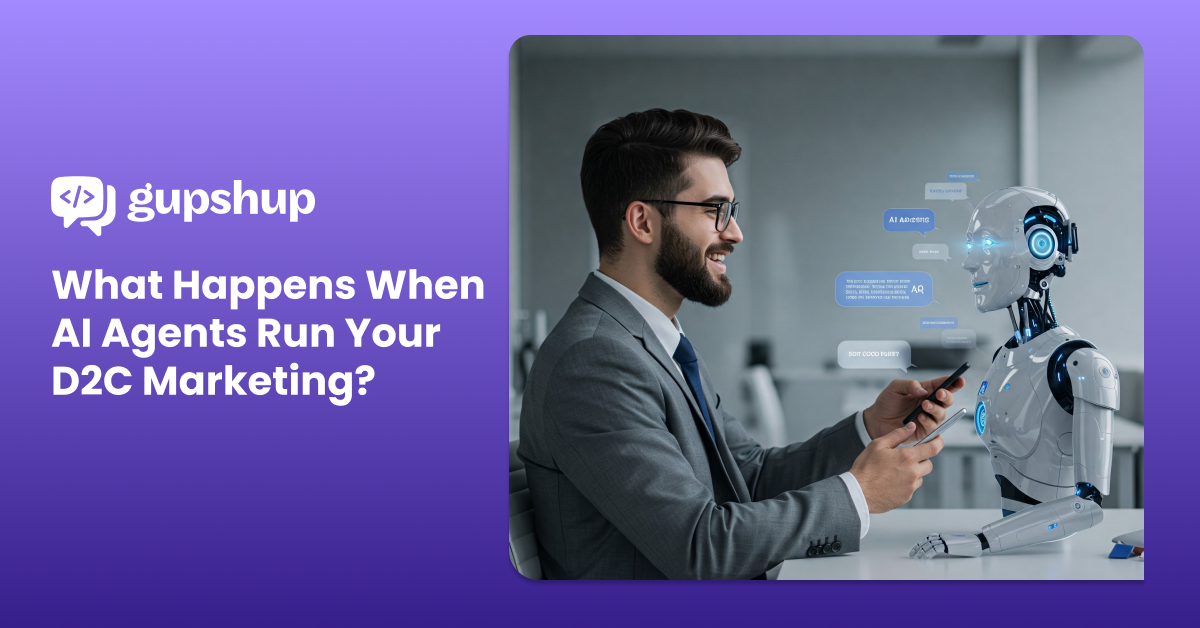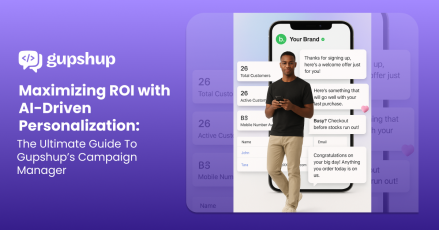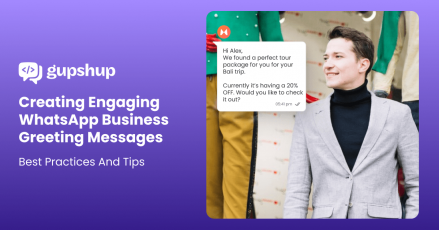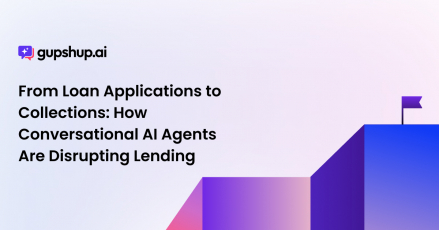What Happens When AI Agents Run Your D2C Marketing?

Introduction
D2C brands operate in a rapidly evolving & competitive business environment where customers expect instant gratification. Every interaction, every sale, and every customer experience rests entirely on your shoulders.
However, if you think traditional methods will bring you efficiency, then you are mistaken. 71% of salespersons’ time is spent on manual tasks, and in a fast-moving D2C landscape, this is a major bottleneck.
The only way forward is marketing automation powered by AI agents. This takes the AI-driven marketing approach one step further by analyzing customer behavior, predicting what they will want next, and automating personalized marketing at scale. They save time and optimize data-driven personalized campaigns for 5-8x higher ROI.
In this blog, learn how AI agents are transforming D2C marketing, helping your brand scale faster without losing its personal touch. Let’s get started.
Understanding AI Agents in D2C Marketing Automation

The D2C model is about speed, efficiency, and personalization. Unlike traditional retail, D2C brands are responsible for everything, from marketing to customer service. As a part of the challenges, they face scalability issues while keeping customers engaged and sales growing.
AI agents solve this by using complex decision-making mechanisms. They are intelligent software programs that can think, learn, and adapt autonomously. They analyze live data, identify patterns, and strategize decisions that would otherwise make you lose 73% of consumers and dealers.
For example, if you run a skincare brand, an AI agent can analyze a customer’s shopping patterns, social media activity, and even weather conditions in their location to recommend the perfect skincare routine. All this happens automatically, in real-time, with zero manual intervention.
Here is a comparison of what your campaigns would look like with and without AI agents:
| Without AI | With AI agents |
|---|---|
| Your email campaigns are generic Your customer support is slow and inconsistent Your ad spend is scattered, with no clear direction | Your emails are dynamic, tailored, and perfectly timed Your support runs 24/7, solving queries before they become problems Your ad campaigns adjust in real time, ensuring maximum ROI |
How Do AI Agents in D2C Marketing Work?

Running a D2C business means you cannot slow down or waste your time on guesswork. You have to deal with customer acquisition, engagement, sales, and retention in real-time.
Conversational AI agents take the load off by automating and optimizing your marketing without losing the personal touch your customers expect.
But how exactly do they work? Here’s a simplified look:
- Perception: Gathers and analyzes data.
- Decision-Making: Sets goals and formulates strategies.
- Action: Create content, manage campaigns, and interact with customers.
- Learning and Adaptation: Uses feedback to improve its future performance.
Now, let’s break it down step by step:
1. They ‘see’ and ‘understand’ your customers:
AI agents start with perceiving. They constantly absorb data from everywhere: your website, social media, customer emails, sales figures, market trends, etc., and look for:
- What products do they browse?
- How long do they stay on a page?
- When do they abandon a cart?
- What they say in chat messages
Then, they act based on what they have learned. This could be anything from personalizing a product recommendation on your website to adjusting your ad spend.
For example, if a visitor lands on your site and spends time looking at anti-aging serums but doesn’t buy, an AI agent gets proactive with:
- Recognizing their interest in skincare
- Offering a limited-time discount on that specific serum
- Sending a personalized email with testimonials and ingredient highlights
- Suggesting a bundle with a matching night cream
2. AI Agents use LLMs to communicate like humans:
LLMs are the brains behind the operation, enabling the AI agents to understand and generate human language. This is crucial for:
- Writing engaging blog posts and social media content
- Personalizing email marketing at scale
- Answering customer queries with human-like responses through a chatbot
For example, a D2C fashion brand can use an AI chatbot that takes help from LLMs and asks, ‘Looking for something casual or a formal denim look? Our new stretch-fit jeans might be perfect for you!’ instead of a plain ‘We’ve got jeans back in stock.’
3. They orchestrate marketing in a team:
Just like in your company, different tasks require different skills, and AI agents can be specialized too. One agent might be a master at analyzing customer data, while another excels at crafting personalized emails.
This is known as ‘agent orchestration’, where a network of AI agents works together, just like a well-coordinated marketing team.
For example, if a customer reaches out with a question about a product, here’s how AI agents handle it:
- An AI chatbot instantly responds to the query.
- A product recommendation AI suggests relevant add-ons based on past purchases.
- A feedback analysis AI records the conversation to identify customer pain points.
- A campaign optimization AI adjusts ad spend based on customer interest.
4. They use RAG to stay updated and relevant:
In a world where information changes quickly, staying up to date is AI’s biggest challenge. Retrieval Augmented Generation (RAG), acts here as a digital research assistant that constantly fetches the relevant data from your internal systems, industry reports, or anywhere else.
Instead of relying on old data, AI agents using RAG, can:
- Pull in recent market trends before crafting a campaign
- Personalize content using real-time customer reviews
- Adjust product recommendations based on what is trending
For example, an electronics brand launching a new smartwatch can use RAG to pull in the latest fitness trends. The AI agent then can create marketing messages that highlight how the smartwatch helps with those specific trends, making ads feel fresh and relevant.
5. They learn and optimize marketing in real time:
Unlike traditional marketing systems that run on set rules, autonomous AI agents continuously learn and adapt.
They use something called ‘reinforcement learning’, which is essentially trial and error. They are given a goal, based on which they experiment, learn from their mistakes, and continuously improve. This self-improving cycle means your marketing never stagnates.
For example, a pet food brand launches an ad campaign and notices their engagement is low. Instead of waiting for a marketing team to tweak things manually, an AI agent:
- Analyze which audience segments are not responding
- Adjusts targeting on the fly
- Swaps out underperforming creatives for high-converting ones
- Changes the ad copy based on real-time feedback
Applications and Use Cases of AI Agents in D2C Marketing
Every 1 in 3 customers would prefer to have an automated purchase rather than buying it from a human agent. In such a landscape, AI agents analyze, predict, personalize, and optimize, turning raw data into real revenue.
Let us see how they are reshaping customer engagement in D2C marketing:
1. Content creation and editing:
AI agents can also act as editors, catching grammatical errors, improving clarity, and ensuring your brand voice is consistent across all channels.
For example, instead of sending generic product updates within a skincare brand, AI scans customer purchase history and creates custom skincare guides for each user. It creates higher email open rates, better engagement, and more sales.
2. Reaching the right people at the right time:
Timing is everything in marketing. AI agents can analyze vast amounts of data to determine the optimal times and channels to deploy your campaigns. They consider everything from audience demographics to past engagement patterns.
For example, an AI agent schedules the new launch of a fitness supplement in a brand based on each customer’s past buying behavior, ensuring they receive offers when they are most likely to purchase.
3. Faster research and idea generation:
Market research can be time-consuming and expensive. AI agents can automate this with:
- Scanning industry reports, competitor strategies, and customer behavior in minutes
- Identifying emerging trends before they go mainstream
- Providing real-time insights to help you stay ahead
For example, before the launch of smart wearables, AI analyzes online discussions and finds that customers want better sleep-tracking features. This insight can shape the entire product launch.
4. Deep consumer insights:
AI agents can sift through mountains of data like web browsing history, purchase behavior, social media interactions, etc., to build a comprehensive picture of each customer. They go beyond basic demographics to understand individual preferences, motivations, and pain points.
This allows you to personalize every interaction and anticipate customer needs. For example, when a home decor brand sees a sudden drop in sales, AI agents dig into customer data, revealing that competitors offer better customization options. This insight helps the brand evolve quickly.
5. Dynamic content customization:
D2C customers expect hyper-personalized interactions. AI agents deliver it by:
- Adjusting website banners based on visitor behavior
- Tailoring email content to individual preferences
- Serving dynamic product recommendations
For example, a sportswear brand uses AI agents to change website content based on visitor preferences. A returning customer who previously bought running shoes comes back for performance socks and workout gear. This boosts cross-sell opportunities.
6. Real-time interaction management:
AI-powered chatbots can handle routine customer inquiries, provide instant support, and even resolve simple issues. This ensures that your customers always have access to help when they need it.
7. Predictive personalization:
AI agents can analyze past behavior to predict future actions. This allows you to be proactive, offering personalized recommendations and promotions before the customer even realizes they need them.
For example, AI agents for a subscription-based coffee brand predict when a customer will run out of coffee and send them a friendly reminder to reorder. This AI-driven marketing prevents churn and enhances customer experience.
8. Handling volume and complexity:
As your business grows, so does the complexity of your conversational marketing efforts. AI agents can handle the volume and complexity of data and interactions, ensuring that your marketing remains effective even as you scale.
They can analyze massive datasets, manage complex campaigns, and personalize interactions with thousands of customers simultaneously.
9. Unified channel integration:
AI agents can integrate your marketing efforts across websites, social media, email, and messaging platforms, ensuring a consistent brand experience. They can centralize customer data and insights, allowing you to create cohesive campaigns that resonate across all touchpoints.
10. Allocating resources wisely:
Marketing budgets need careful planning. AI agents can analyze real-time data to:
- Identify high-opportunity moments
- Adjust ad spend based on real-time performance
- Reduce wasted resources on low-impact campaigns
11. Future-proofing your AI-driven marketing:
Markets evolve fast. AI agents are designed to adapt to these changes, ensuring that your marketing efforts remain relevant and effective. They can learn from new data, adjust to changing trends, and even anticipate future developments.
For example, a subscription-based brand initially focused on beauty products. But AI agents detect rising interest in eco-friendly packaging and sustainable products, helping the brand pivot before competitors do.
12. Quantifiable metrics and KPI tracking:
Measuring marketing success is critical. AI helps by:
- Tracking engagement, conversion rates, and ROI
- Providing detailed insights into what is working and what is not
- Making campaign adjustments in real-time
The Evolution of Consumer Expectations
You have built a successful business, but the rules of marketing have changed. Today’s consumers expect personalized, effortless experiences at every touchpoint. They want brands to anticipate their needs, not just react to them.
Meeting these heightened expectations demands more than traditional marketing. It requires intelligent, adaptable solutions. Here, Gupshup helps you with a tailored solution of AI agents.
Our AI-driven conversational marketing platform empowers you with live agents, data-driven performance monitoring, and AI co-pilot features. We help you create those personalized, real-time interactions that build lasting loyalty and drive revenue.
Connect with us for a demo and win this new era of marketing automation. The future of D2C awaits you!
FAQ’s
1. How do AI agents prevent marketing fatigue?
They optimize messaging frequency, segment audiences, and personalize content to keep customers engaged without overwhelming them.
2. How do AI agents impact customer lifetime value (CLV)?
By enhancing personalization, automating retention strategies, and optimizing upselling opportunities, AI agents increase CLV.
3. Are AI agents cost-effective for small D2C brands?
The AI agents reduce manual work, improve efficiency, and scale marketing efforts without requiring large teams.







